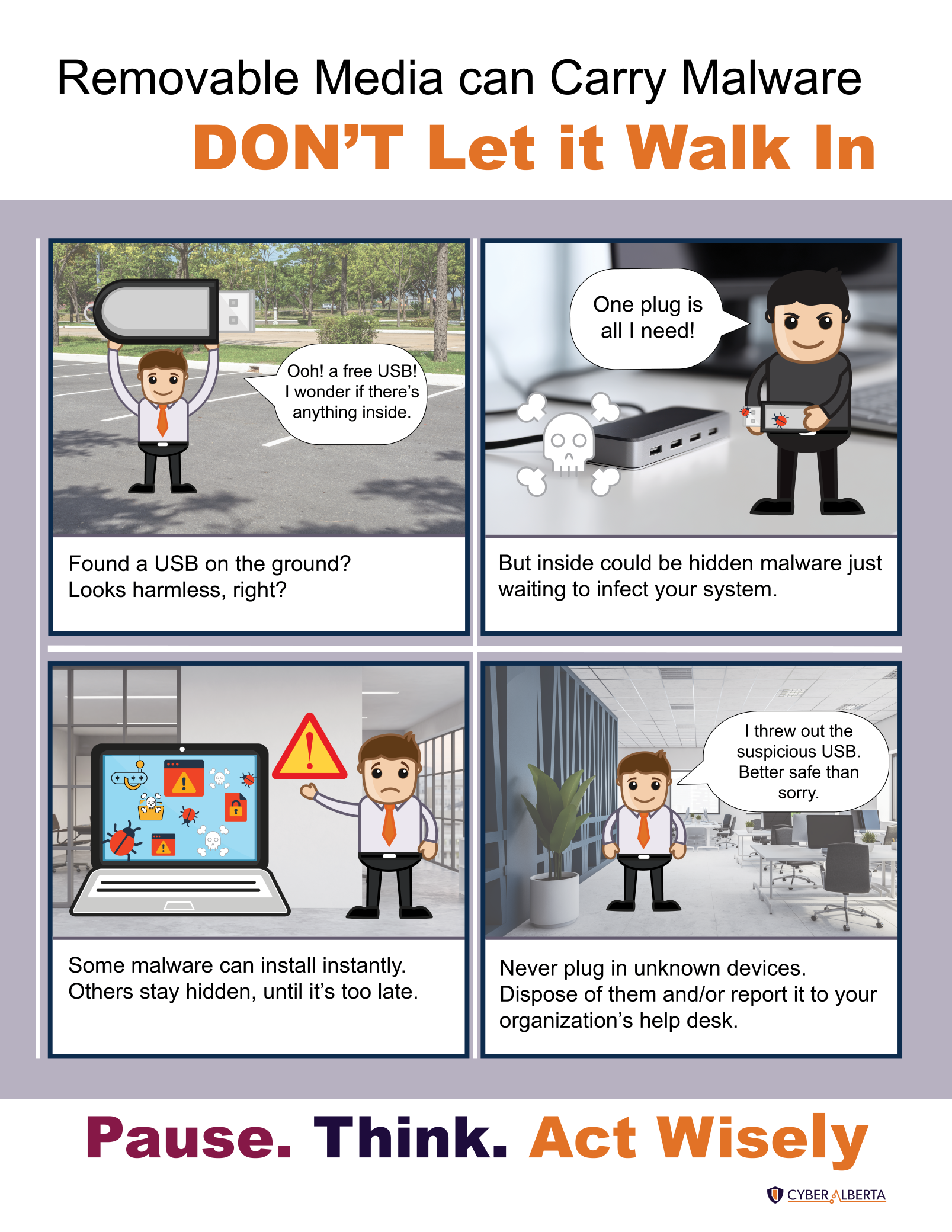Protect What Matters: Devices, Accounts, and Information
October is Cybersecurity Awareness Month—a time to reinforce the shared responsibility we all have in safeguarding sensitive information. For professionals across Alberta, secure travel isn’t just a personal precaution—it’s a business imperative.
Whether you're attending a conference, working remotely, or visiting a client site, traveling with company assets introduces unique risks. Laptops, mobile devices, printed documents, and access credentials are all valuable targets, and protecting them requires proactive habits and informed decision-making at every step.
CyberAlberta encourages organizations and professionals to adopt and promote secure travel practices that help protect what matters most: devices, accounts, and information.
Secure Travel Practices for Professionals
Use a Virtual Private Network (VPN) When Accessing Corporate Resources
Public Wi-Fi networks are often unencrypted and vulnerable, allowing attackers to intercept your data. A VPN secures your connection, shielding data from theft and keeping communications private. It also safeguards internal systems by preventing unauthorized access.
Tip: Configure your VPN to auto-connect at startup to ensure continuous protection without any extra steps.
Avoid Public Wi-Fi When Possible
If you must connect to public networks, avoid accessing sensitive systems or documents without a VPN. A mobile hotspot or tethered connection from a secure and trusted device is a safer alternative.
Why it matters:
- Helps prevent attackers from secretly intercepting your information while it's being sent.
- Helps protect data from being intercepted and reduces the risk of network-based attacks. However, it’s important to stay alert—VPNs do not protect against phishing scams or fake websites that can steal your login credentials. Always verify website authenticity.
Tip: You can disable auto-connect to public networks in your device settings—this is supported on Windows, macOS, iOS, and Android.
Stay Aware of Your Surroundings
Cybersecurity extends beyond the screen. When working in public or unfamiliar environments, it’s important to stay aware of your surroundings. Sensitive information can be overheard, screens can be viewed from a distance, and devices can be tampered with or tracked. A single lapse in physical security can lead to financial loss and reputational damage for both individuals and organizations.
Good Practices when working in public or semi-public spaces:
- Use privacy screens to limit viewing angles and prevent shoulder surfing.
- Apply webcam covers to block unauthorized access to your camera when not in use.
- Store devices in Faraday bags when not in use to protect against wireless hacking or tracking.
Staying alert helps reduce the risk of shoulder surfing and device tampering, especially in shared spaces.
Tip: Use privacy screens and lock your device when stepping away—shortcut keys like Windows + L make it easy.
Secure Devices and Documents
Never leave company assets unattended. Keep all devices and sensitive materials secure—lock your phone and computer, encrypt USBs and other storage devices, and store printed documents securely. Avoid leaving devices in vehicles. If you must, store them out of sight—preferably in a locked trunk. And if you don’t need a device for your trip, leave it at home or in the office. Traveling light reduces risk.
If traveling internationally, be aware of local laws that may impact data privacy and device inspections. Taking these precautions helps reduce the risk of loss, theft, or unauthorized access, especially in environments where control over physical security is limited.
Tip: Follow Microsoft’s guide to encrypt your USB drives to protect sensitive data.
Collaborate to Strengthen Alberta’s Cyber Resilience
Cybersecurity is a shared responsibility. By practicing secure travel habits and promoting awareness within your organization, you help build a stronger, more resilient cybersecurity ecosystem across Alberta.
Pause. Think. Act wisely.
Together, we can protect what matters most—devices, accounts, and privacy—wherever work takes us.

Breach Brief: RCMP Lost USB Device Incident
In March 2022, the Office of the Privacy Commissioner of Canada was alerted to a serious data breach involving RCMP data. An unencrypted USB device containing sensitive personal information of 1,741 individuals was lost, and the loss went unreported. The device and its data were later discovered to be circulating for sale within criminal networks.
This incident illustrated how easily small portable media devices like USBs can be misplaced and how severe the consequences can be. When travelling, the risk of loss or theft is even higher. Encrypting devices are a critical first step in preventing a lost items on a trip from becoming a large-scale breach.
Read the full investigation by the Office of the Privacy Commissioner of Canada